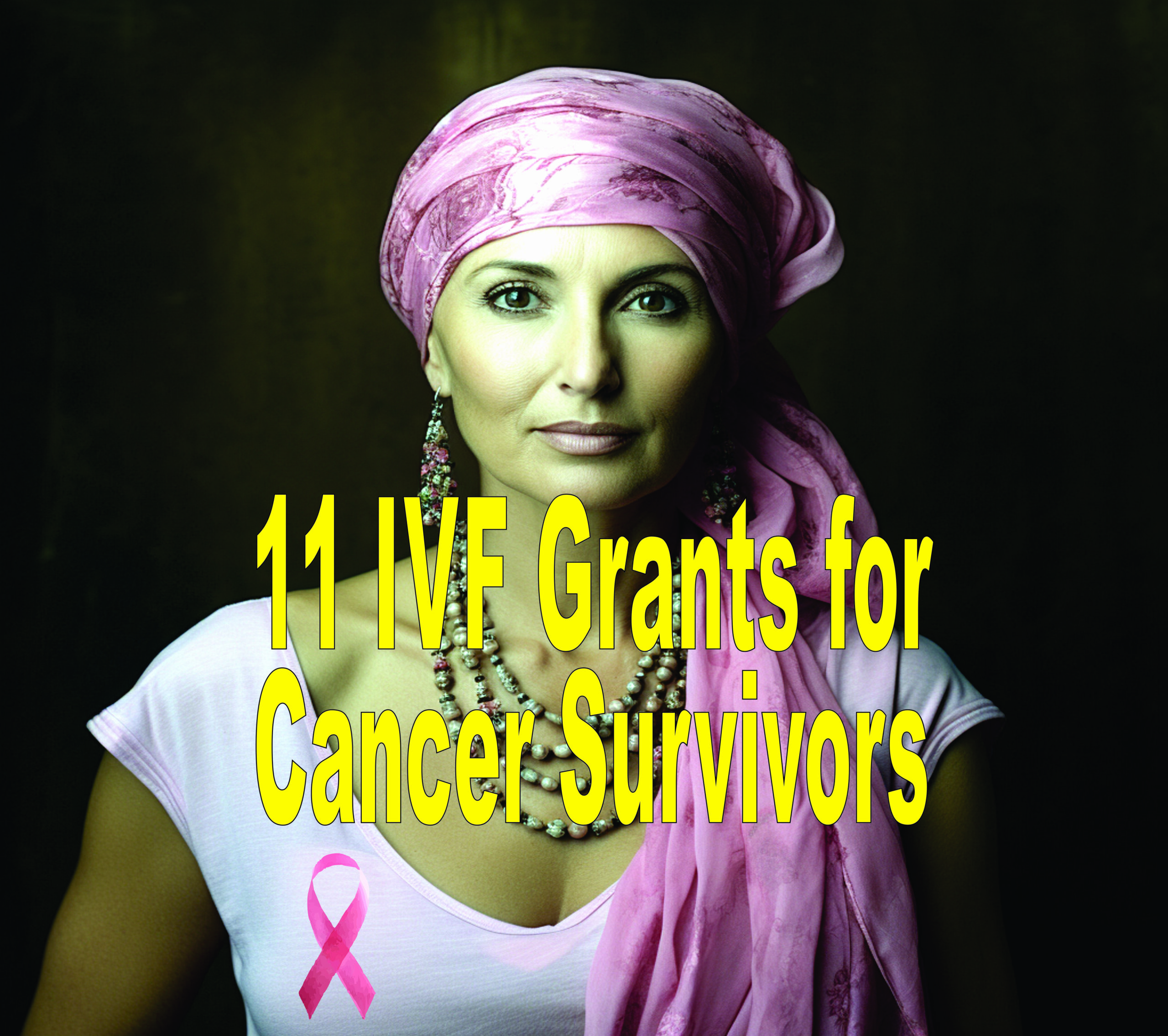Last Updated on January 29, 2024 by Lori Pace
IVF grants are available to cancer patients and survivors. They help them keep their fertility and have a child. So, patients can explore all treatment options to help them achieve their dream of starting a family after cancer.
However, some cancer treatments or surgeries can lead to the need to remove organs. A change in hormone levels can sometimes cause damage to a woman’s eggs. Hence, females can experience temporary or permanent fertility problems due to cancer.
So, In Vitro Fertilization (IVF), which may help preserve fertility, is an option for some women. Yet, these services can be costly. To help cancer survivors overcome these barriers and have children, IVF Grants are available.
IVF Grants for Cancer Survivors – Fertility Preservation and Treatments
Radiation therapy and chemotherapy are used to treat multiple types of cancer. These effective treatments can lead to fertility problems.
To reduce the chance of complications, an oncologist might consider:
- Reducing the radiation to lessen the side effects on the reproductive organ
- Protecting reproductive organs against unnecessary radiation exposure
- Substituting for less toxic chemotherapy drugs that don’t contain classic alkylating agents
- Other options for preserving fertility
Both men and women can have children after receiving cancer treatment. This is possible by keeping their options open. Moreover, it is recommended that you wait at least six months to 1 year after cancer treatment to get pregnant. This reduces the chance of developing congenital disabilities.

Fertility Preservation for Women
Preserving fertility is possible with embryo and egg freezing. After completing their cancer treatment, women who opt for embryo freezing may have fertilised eggs (embryos) safely implanted through frozen embryo transfer. Before implantation, the embryos are tested for genetic cancer risk.
Besides, before implantation of embryos, patients who opt for egg freezing must first have their eggs fertilised in the laboratory.
In short, for women who have had their cervical cancer treated or cannot have a baby due to other issues, gestational surrogacy may be an option. However, this procedure may involve the transfer of the embryo to another woman, who then carries the baby.
Fertility Preservation for Girls
Of course, egg or embryo preservation methods are not recommended for girls who have not reached puberty yet and have cancer. So, varian tissue freezing may be an option. Many eggs are contained by the tissue and can be protected from freezing or thawing.
Once the treatment is completed, and the patient has reached the age at which she wishes to start a family of her own, she can have her frozen egg tissue transferred to help her conceive naturally or via IVF.
Fertility Treatments for Boys and Men with Cancer
Sperm banking, also known as freezing sperm, is a well-known preservation technique for men in their reproductive years. Before you begin the treatment, the sperms must be collected naturally.
Harvesting sperm is a problem for young boys and men in their teens. So, electroejaculation can be used in these cases where anaesthesia is administered. They use an electric probe for sperm collection, for . Sometimes, surgery may be necessary to extract sperm directly from the testicles.
IVF Grants for Cancer Patients – Reduce the Cost of Treatment
Although sperm preservation is affordable, embryo and egg freezing are much more costly. Egg freezing can be expensive at around $6,000-$7,000 and embryo freezing can run up to $10,000, for instance.
Moreover, even though there are health insurance plans, they do not cover the treatment. However, there are IVF grants available for survivors of cancer that can help reduce the cost of treatment.
1. AttainFertility
AttainFertility provides affordable IVF care for eligible patients through the IVF Assist program. It also offers education on fertility preservation for both men and women with cancer. Visit their AttainFertility website for more information.
2. Bonei Olam
Bonei Olam provides large-scale funding for all aspects related to infertility treatment. Financial assistance is available through the Pre-Cancer and Post-Cancer programs. This program helps individuals get the treatment they need to start a family. So, please visit the Bonei Olam website for more information.
3. Livestrong Fertility
For women and men with newly diagnosed cancer, Livestrong Fertility offers financial assistance. These programs can also help offset the cost of sperm freezing, egg freezing, and embryo freezing.
4. Team Maggie for a Cure
Team Maggie for a Cure provides grants to under-insured and uninsured teens or young adults diagnosed as having cancer. So, for the preservation of eggs and sperm, the grant is up to $2,500 for residents of the United States.
This non-profit organization offers financial assistance to help with fertility preservation costs. Visit Team Maggie for a Cure for more information.

5. International Council for Infertility Information Dissemination
INCIID offers IVF scholarships to couples and individuals who have trouble financially. In short, they review scholarships and set the deadline for applying for scholarships at the end of the month.
This program covers most of the IVF costs. Moreover, INCIID organizes IVF clinics throughout the United States. These clinics can help patients achieve their dreams of starting a family and provide financial support. Visit the INCIID website for more information.
6. The National Adoption Foundation (NAF)
You may use the NAF grants to cover the cost of adoption. There are also innovative and non-traditional fundraising programs.
There is no income threshold to be eligible for the grant program. This grant program is available to legal adoptions of any kind, whether they are private or public.
You will need to fill out a simple one-page application. Visit The National Adoption Foundation website for more information.
7. Tina Q. Cade Foundation
Tina Q. Cade Foundation offers financial assistance for families who are struggling with infertility and domestic adoption. Education and outreach on related topics are also provided.
Tina Q. Cade Foundation Family Building Grant provides up to $10,000 for needy families. Besides, it is awarded twice per year. So, please visit Tina Q.Cade for more information.
8. Verna’s purse
Verna’s Purse provides financial support to cancer survivors. They also provide long-term, discounted storage for semen, ovarian tissues, or embryos. Visit Verna’s Purse website for more information.
9. Samfund Grant
SAM Fund grants IVF to young adults diagnosed with cancer. The grant covers a wide variety of costs to help those with cancer, reaching up to $4000. So, there are two types of family building grants available:
- Up to $1,000 for storage of eggs, embryos, or sperm
- Costs associated with fertility procedures, such as IVF, testing, surrogacy, and adoption. (Maximum $4,000).
Visit Samfund Grant for more information.
10. Fertile Action’s Parenthood after Cancer Treatment Grant (PACT).
PACT is an IVF grant that supports cancer survivors. Therefore, the applicant receives discounted or donated IVF, egg donation, or surrogacy services. Of course, an applicant must have been diagnosed with cancer to be eligible. Visit the PACT website for more information.
11. Heart Beat Program
Ferring Pharmaceuticals offers the Heart Beat Program. Women who have just been diagnosed with cancer receive selected fertility drugs for egg freezing and embryo preservation. Visit the Heart Beat website for more information.
Conclusion
Financial toxicity is a common problem for young cancer survivors and patients. It can also impact their mental well-being and the quality of their life. It is possible to have impaired fertility or infertility after cancer treatment, that’s why you should consider this grant.
Patients in such situations will need to undergo expensive assisted reproductive technology to build their own families. IVF grants for cancer survivors can reduce the financial burden involved in building a family.
However, if you are not a cancer survivor but still struggling to pay for IVF expenses, there are IVF Grants that you can consider apply for.

